#bertram bennet
Text
The Tilney Family Album: Volume XV
More Tilneys today.

Domestic bliss with Esther and Eleanor.

If only Eleanor would put her logic toy down for a moment, Esther has something very important to ask her.
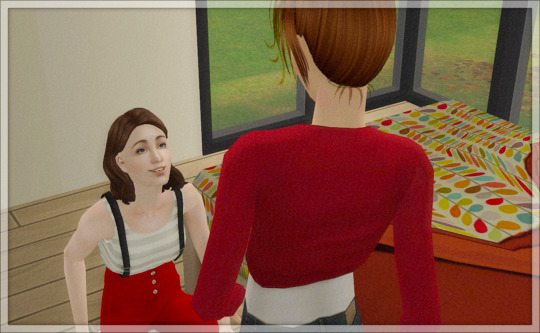
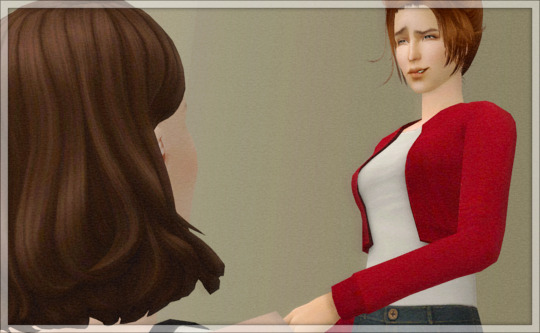
This isn't really going quite how Esther envisaged...


but she ploughs on gamely.

It's all too much too soon for Eleanor...
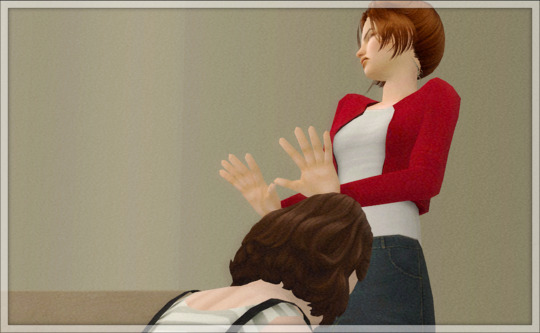
and she has to refuse.

She does love Esther, but thinks it's far too soon to be making a long-term commitment to each other.

Anyway, right now, there's a party to concentrate on!

Cousins and best mates Bertram and Bennet find a quiet spot to chill out and catch up.
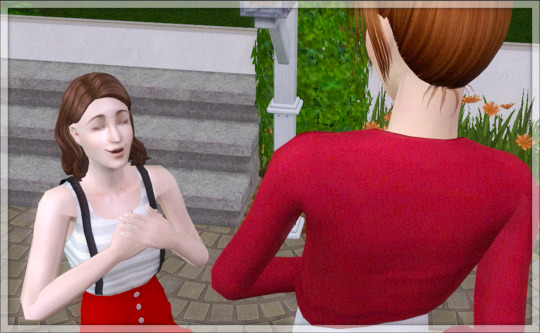

Esther figures that maybe Eleanor just needed to sleep on it.
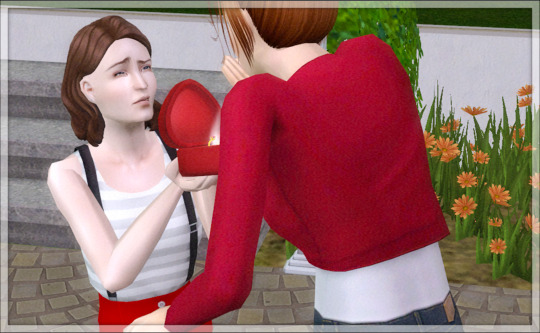
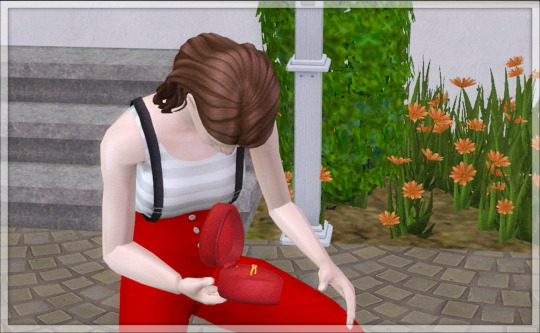
But no, Eleanor really knows her own mind on this.

Besides, Eleanor is too distracted by saying a final farewell to Max to think about anything else right now. (Sorry for the lousy picture, but I was taken completely by surprise - much like Joanna!)

Esther is sure she knows the way to her girlfriend's heart, and presents Eleanor with a gift that she has been absolutely longing for. They don't have much money to spare, but it was worth every penny, to see the delight on her beloved’s face.


And - just maybe - her thoughtfulness will make Eleanor realise that they're really meant to be together, forever.

Eh, no.

But despite their strained relationship, Eleanor really is delighted with the top-notch telescope that Esther gave her.
(Today's instalment was brought to you by @lazyduchess's Autonomous Engagement mod.)
#sims 2#gameplay#merybury#eleanor tilney#esther dashwood#max tilney#bertram bennet#bennet tilney#joanna brandon#tilney family#dashwood family
20 notes
·
View notes
Note
Could you rank the Austen main couples from the least to the most likely to have sex before they are married?
Least to Most Likely:
Edmund Bertram & Fanny Price: It is all very proper. They probably have sex with their clothes on after the wedding.
Fitzwilliam Darcy & Elizabeth Bennet: She would have been down, he wasn't. He later congratulates himself on his excellent self control.
Edward Ferrars & Elinor Dashwood: There were definitely smooches, but after that roller coaster of a courtship, Elinor wants things legal and in writing. Also, just because something feels good doesn't make it right, MARIANNE.
Henry Tilney & Catherine Morland: he is a gentleman, but it was really the long distance relationship that prevented them from doing anything. Was there some racy content in those letters? I'd love to know...
George Knightley & Emma Woodhouse: Donwell is right there. You can walk right over...
Charles Bingley & Jane Bennet: "Bingley, who wanted to be alone with Jane" I see your intentions, sir. I see them!
Colonel Brandon & Marianne Dashwood: "I have feelings," said she, "let's indulge them." If something feels good, that makes it moral, right? Romanticism says yes, ELINOR.
Captain Frederick Wentworth & Anne Elliot: Do not care about anything except getting married as quickly as possible. Banns take far too long when you've been waiting 8 years and Napoleon just escaped from Elba. Let's get this DONE.
BONUS:
Lucy Steele & Robert/Edward Ferrars: No way in hell with either of them. She's too cunning to give up her best card before she has the man secure.
Frank Chuchill & Jane Fairfax: Not in a million years, no matter how many times Frank makes puppy eyes.
Robert Martin & Harriet Smith: Abbey Mill farm is like, right there. You can walk over. It has a hay barn...
Related: First Kiss for each Austen Heroine Couple
Also, marriage and birth records show that premarital sex was pretty common. Or else the Regency era had magically good premature baby care 😉
#jane austen#question response#anticipating their vows#austen main couples#am I going to tag them all or be lazy?#edmund bertram#fanny price#elizabeth bennet#fitzwilliam darcy#jane bennet#charles bingley#emma woodhouse#george knightley#captain wentworth#anne elliot#elinor dashwood#marianne dashwood#colonel brandon#henry tilney#catherine morland
393 notes
·
View notes
Text
all in all I did like this book, even though the plot was a bit all over the place at times imo. and I'm not sure if I like austen's writing style. it was much harder to get into it than emily bronte's, that's for sure. mostly because it was so subdued at all times - the emotional scenes were there, but there was nothing like cathy's "I am heathcliff". but maybe it's just bc this book is about 20 years older than wuthering heights, plus a different genre.
at any rate, I do think jane austen has some great romances, primarily lizzie and darcy in pride and prejudice, but also fanny and edmund - which were very unusual bc they were friends to lovers with a friendzoned girl for once, so I did like that a lot. I guess to me in total, it was a good book, but not great book. I do see myself rereding it though, if I ever want to majorly relate to an infp character again.
this makes me think: the last fictional character (apart from remus of course, who is probably not an infp though - edmund reminded me a lot of him btw) I really related to was inej, who might be an infp as well? more likely an infj, though. honestly, myers-briggs types are my astrology.
#mansfield park#jane austen#emily bronte#lizzie bennet#fitzwilliam darcy#pride and prejudice#fanny price#edmund bertram#remus lupin#inej ghafa#infp
5 notes
·
View notes
Text
Thinking about how Jane Austen's six novels taken together (in writing order, not publication order) become an increasingly scathing criticism of social class, i.e:
Northanger Abbey: Individual members of the gentry (General Tilney, chiefly) come in for some criticism, but mostly on a personal level: General Tilney is a grasping, tyrannical father to be sure but we hear little (though we might easily infer) of what he is like as the resident landholder. The final crisis of the novel, General Tilney's refusal to sanction Henry and Catherine's marriage, is resolved by Eleanor's marriage to a Viscount.
Sense and Sensibility: The "correctness" and "elegance" of the fashionable members of society- the Dashwoods, Robert Ferras, Lady Middleton- are negatively contrasted to the warmness and frankness of Mrs Jennings- whose kind-heartedness makes her more attractive, in spite of her lower-class origins and perceived vulgarity, than Fanny, Lady Middleton or Mrs Ferras (snr).
Pride and Prejudice: The aristocratic Lady Catherine de Bourgh is an interfearing busy body whose title and money only excuse her officiousness and rudeness. Darcy's pride in his superior situation to the Bennets leads him to act wrongly with regard to Bingley and Jane. Aunt and Uncle Gardiner, in trade, are more respectable- certainly better parental figures- than the gentleman Mr Bennet (and Mrs Bennet too). At the same time - Darcy's strengths are displayed in his undertakings as the resident landholder of the Pemberly estates- he supports the poor, and his situation allows him to shield the more vulnerable when he his spurred to act (Georgiana, to a less successful extent Lydia). Wickham's circumstances - debt, etc- could easily be read as the consequences of his wanting to step out of his place- his desire to be the oldest, or at least the second, son of a Mr Darcy- rather than what he 'is'- the son of Mr. Darcy's steward
Mansfield Park: Hey. HEY. look at the shitshow of a baronetcy. Lady Bertram is functionally useless. Sir Thomas is such a bad father that his daughters marry idiots just to get away from him. Also, having money can't give you intelligence or a personality. Most of "fashionable society" are actually miserable and mercenary and also probably immoralistic. The Church is clouded by corruption and isn't actively benefiting the local parish the way it should. The whole thing is underpinned by slavery, and the hardworking Price Children are ultimatley more deserving than the flighty Bertram ones. THAT BEING SAID: the portrait of Mr. Price is hardly better than the one of Sir Thomas, and Mansfield Park does stabilise- indeed, begins grows stronger with the reformation of its heir, and the implication that Fanny and Edmund go on to have children of their own. There is less of a quarrel with establishment, and more of a quarrel with the people who fill it.
Emma: "Gentility is inherent one can sense it in a person-" no you can't lmao shut up. There is literally no inherent difference marking out a gentleman's daughter and a farmer's daughter. Emma's snobbery as to class leaves her, at various times, both isolated and into some *serious* missteps. Emma and Frank Churchill both have a tendency to treat others as playthings, as their money allows them to do so.
Persuasion: The peerage/nobility are patently ridiculous throw them out in favour of [relative] meritocracy and hard workers. Sure, the resident landowners are supposed to be of benefit to those beneath them but they're not, actually, they take all of the privileges and fulfil non of the responsibilities and are pretty much uniformly selfish and our heroine Casts Them Off.
#jane austen#class#its late okay i haven't neccessarily thought about it *thoroughly* but. y'know.#i thought#northanger abbey#sense and sensibility#pride and prejudice#mansfield park#emma#persuasion
495 notes
·
View notes
Text
Austen siblings: the worst of the worst
Please vote based on their depiction in the books, not the movies. Other than that, use whatever criteria you want. Most toxic? Least well-suited to each other? Most well-suited to being awful together? Most annoying? Least realistic? Up to you!
These are in alphabetical order by last name, so read the whole list before voting!
I have a best Austen siblings poll too.
#yes the crawfords are on both the best and worst polls#and i expect will get votes on both#jane austen characters#jane austen#siblings#polls
77 notes
·
View notes
Text
💕💕💕💕
#i am big enough to admit that i love austen because she gets my particular brand of neurotic and hysterical weirdo#dollsome's deep thoughts#jane austen#you know when you can just tell that you're the most highly strung person in the universe?#but then hey!!!!! there's some just like you upon jane austen's immortal pages!!!!!!#driving her more reasonably minded heroes and heroines cray!!!!!!
48 notes
·
View notes
Text
“It is a truth universally acknowledged, that a single man in possession of a good fortune, must be in want of a wife.” - Pride and Prejudice
"Only half a hundred times," Dany teased. "You gave up too easily, my lord. For I must marry, all agree."
"A khaleesi must have a khal," said Irri, as she filled the queen's cup once again. "This is known." - Daenerys, ADWD.
I have been listening to Austen on my way to work everyday. Finished P&P and have taken up Mansfield Park. It's, IMO, singularly boring and not as entertaining as the rest of Austen's work. It's incredibly slow, there's pages and pages of events that does not push the plot forward - like the play the Bertrams and Crawfords put on - and Fanny is the least interesting of Austen's female leads.
There have been discussions on how, in terms of Austen heroines, Arya Stark comes closest to Elizabeth Bennet with regards to her questioning of the patriarchal ideals of femininity, her wit and vivacity, as detailed here and here.
However, I did notice some similarities between the characters/dynamics of Mansfield Park, the Starks of ASoIaF and one my asoiaf ships Jonrya!
First, there is 10 year old Fanny feeling the outcast and lonely at Mansfield Park until Edmund steps in and befriends her.
Afraid of everybody, ashamed of herself, and longing for the home she had left, she knew not how to look up, and could scarcely speak to be heard, or without crying.
Her feelings were very acute, and too little understood to be properly attended to. Nobody meant to be unkind, but nobody put themselves out of their way to secure her comfort. - Fanny, MP
Reminds me of Arya in King's Landing feeling lonely and missing her home, brothers and especially Jon Snow.
That was when Arya missed her brothers most. She wanted to tease Bran and play with baby Rickon and have Robb smile at her. She wanted Jon to muss up her hair and call her “little sister” and finish her sentences with her. But all of them were gone. She had no one left but Sansa, and Sansa wouldn’t even talk to her unless Father made her. - Arya, AgoT
She went back to the window, Needle in hand, and looked down into the courtyard below. If only she could climb like Bran, she thought; she would go out the window and down the tower, run away from this horrible place, away from Sansa and Septa Mordane and Prince Joffrey, from all of them. Steal some food from the kitchens, take Needle and her good boots and a warm cloak. She could find Nymeria in the wild woods below the Trident, and together they’d return to Winterfell, or run to Jon on the Wall. She found herself wishing that Jon was here with her now. Then maybe she wouldn’t feel so alone. - Arya, AGoT
We have Fanny sad and feeling like no one really understands or cares for her and then being comforted by Edmund.
A week had passed in this way, and no suspicion of it conveyed by her quiet passive manner, when she was found one morning by her cousin Edmund, the youngest of the sons, sitting crying on the attic stairs.
“My dear little cousin,” said he, with all the gentleness of an excellent nature, “what can be the matter?” And sitting down by her, he was at great pains to overcome her shame in being so surprised, and persuade her to speak openly.
This mirrors Arya's relationship with Jon, where we know he is whom she goes to for solace and companionship - not her father, mother or other siblings. It's Jon Snow. Like getting bullied over her appearance leading to her thinking she was a bastard and getting comforted by Jon Snow.
"A shade more fun than needlework," Arya gave back at him. Jon grinned, reached over, and messed up her hair. Arya flushed. They had always been close. Jon had their father's face, as she did. They were the only ones. Robb and Sansa and Bran and even little Rickon all took after the Tullys, with easy smiles and fire in their hair. When Arya had been little, she had been afraid that meant that she was a bastard too. It had been Jon she had gone to in her fear, and Jon who had reassured her. - Arya, AGoT
Edmund and Fanny becoming very close and Edmund helping Fanny get pen and paper to write home and selling his own horse to get a new horse for Fanny so that she can go riding - which she loves to do!
For a long while no answer could be obtained beyond a “no, no—not at all—no, thank you”; but he still persevered; and no sooner had he begun to revert to her own home, than her increased sobs explained to him where the grievance lay. He tried to console her.
“If that be all your difficulty, I will furnish you with paper and every other material, and you may write your letter whenever you choose. Would it make you happy to write to William?” - MP
Though Edmund was much more displeased with his aunt than with his mother, as evincing least regard for her niece, he could not help paying more attention to what she said; and at length determined on a method of proceeding which would obviate the risk of his father’s thinking he had done too much, and at the same time procure for Fanny the immediate means of exercise, which he could not bear she should be without. He had three horses of his own, but not one that would carry a woman. Two of them were hunters; the third, a useful road-horse: this third he resolved to exchange for one that his cousin might ride; he knew where such a one was to be met with; and having once made up his mind, the whole business was soon completed. The new mare proved a treasure; with a very little trouble she became exactly calculated for the purpose, and Fanny was then put in almost full possession of her. - MP
Jon secretly gets a sword, light and thin, made especially to fit Arya's hands and gifts it to her because she wants to learn how to use a sword.
“I have something for you to take with you, and it has to be packed very carefully.” Her face lit up. “A present?”
“You could call it that. Close the door.”
Wary but excited, Arya checked the hall. "Nymeria, here. Guard." She left the wolf out there to warn of intruders and closed the door. By then Jon had pulled off the rags he'd wrapped it in. He held it out to her.
Arya's eyes went wide. Dark eyes, like his. "A sword," she said in a small, hushed breath.
"I can be fast," Arya said.
"You'll have to work at it every day." He put the sword in her hands, showed her how to hold it, and stepped back. "How does it feel? Do you like the balance?"
"I think so," Arya said.
Arya ran to him for a last hug. "Put down the sword first," Jon warned her, laughing. She set it aside almost shyly and showered him with kisses. - Jon, AGoT
Then there are the other supporting characters.
There's Tom Bertram who's like Robb, the eldest son and heir who treats Fanny like a little sister.
Edmund was uniformly kind himself; and she had nothing worse to endure on the part of Tom than that sort of merriment which a young man of seventeen will always think fair with a child of ten. He was just entering into life, full of spirits, and with all the liberal dispositions of an eldest son, who feels born only for expense and enjoyment. His kindness to his little cousin was consistent with his situation and rights: he made her some very pretty presents, and laughed at her. - MP
There's a Mrs. Norris who is very similarly to Septa Mordane in her treatment of Fanny Vs the Bertram daughters, always putting down Fanny to uplift the other girls - similar to how the Septa drags Arya down to uplift Sansa. This has a detrimental effect on the Bertram girls just like it does for Sansa - encouraging them to be mean to Fanny in the same way Sansa/Jeyne mock Arya.
The Bertram sisters mock Fanny for not being good at music or drawing and is told by their aunt Norris that this indeed makes Fanny stupid.
“Yes, I know there is, till I am seventeen. But I must tell you another thing of Fanny, so odd and so stupid. Do you know, she says she does not want to learn either music or drawing.”
“To be sure, my dear, that is very stupid indeed, and shows a great want of genius and emulation. But, all things considered, I do not know whether it is not as well that it should be so, for, though you know (owing to me) your papa and mama are so good as to bring her up with you, it is not at all necessary that she should be as accomplished as you are;—on the contrary, it is much more desirable that there should be a difference.”
And as Austen succinctly and rightly puts it, this sort of encouragement and mentorship from their aunt Norris leads to a lack of humility and generosity in the sisters.
Such were the counsels by which Mrs. Norris assisted to form her nieces’ minds; and it is not very wonderful that, with all their promising talents and early information, they should be entirely deficient in the less common acquirements of self-knowledge, generosity and humility. - MP
We see this in AGoT Sansa - the lack of self-awareness, of humility and generosity in the way she treats Arya, Jon, the small folk, Mycah and even Jeyne Poole. Septa Mordane's thoughts and opinions have had a negative effect on ALL her pupils. It's encouraged Arya's low self-esteem and Sansa's vanity and classism.
And while Septa Mordane, Sansa and Catelyn always put Sansa on a higher pedestal than Arya in terms of perfection, intelligence and beauty, it's Jon Snow who considers Arya to be clever and pretty.
"What could you want to see?" Sansa said, annoyed. She had been thrilled by the invitation, and her stupid sister was going to ruin everything, just as she'd feared. "It's all just fields and farms and holdfasts."
"Hodor!" Sansa yelled. "You ought to marry Hodor, you're just like him, stupid and hairy and ugly!" She wrenched away from her sister's hand, stormed into her bedchamber, and barred the door behind her. - Sansa, AGoT
But what if Arya was not there to be saved? What if Lady Melisandre's flames had told it true? Could his sister truly have escaped such captors? How would she do that? Arya was always quick and clever, but in the end she's just a little girl, and Roose Bolton is not the sort who would be careless with a prize of such great worth. - Jon, ADwD
"Good." She had never cared if she was pretty, even when she was stupid Arya Stark. Only her father had ever called her that. Him, and Jon Snow, sometimes. Her mother used to say she could be pretty if she would just wash and brush her hair and take more care with her dress, the way her sister did. To her sister and sister's friends and all the rest, she had just been Arya Horseface. - Arya, ADwD
And despite aunt Norris and the Bertram girls finding Fanny to be deficient and stupid, Edmund thinks of her as clever and capable.
“To be sure, my dear, that is very stupid indeed, and shows a great want of genius and emulation. - Aunt Norris, MP
Kept back as she was by everybody else, his single support could not bring her forward; but his attentions were otherwise of the highest importance in assisting the improvement of her mind, and extending its pleasures. He knew her to be clever, to have a quick apprehension as well as good sense, and a fondness for reading, which, properly directed, must be an education in itself. - Edmund, MP
Fanny has a lot of love for Edmund, a mixture of gratitude and affection.
In return for such services she loved him better than anybody in the world except William: her heart was divided between the two.
She regarded her cousin as an example of everything good and great, as possessing worth which no one but herself could ever appreciate, and as entitled to such gratitude from her as no feelings could be strong enough to pay. Her sentiments towards him were compounded of all that was respectful, grateful, confiding, and tender. - MP
Edmund and Fanny consider themselves brother and sister, love each other that way and there is a strong emotion there between them.
"By eight in the morning Edmund was in the house. The girls heard his entrance from above, and Fanny went down. The idea of immediately seeing him, with the knowledge of what he must be suffering, brought back all her own first feelings. He so near her, and in misery. She was ready to sink as she entered the parlour. He was alone, and met her instantly; and she found herself pressed to his heart with only these words, just articulate, 'My Fanny, my only sister; my only comfort now!' She could say nothing; nor for some minutes could he say more." - MP
“What do you know of my heart, priestess? What do you know of my sister?
Bring her home, Mance., and now I am about to save four thousand of your free folk. You owe me this one little girl. - Jon, ADwD
Despite growing up together, Edmund and Fanny do part as Edmund goes to college and Fanny stays at home. They write to each other and keep in touch, which Jon and Arya cannot do. And while going through their harrowing journeys (Arya) and climbing the ladder to Lord Commander (Jon) they miss each other dearly and want to see each other again.
There are of course differences. I find Jon's love and admiration/respect for Arya to be greater than Edmund's for Fanny. Jon thinks Arya is perfect as is while Edmund sees himself as helping Fanny grow as a person. All the girls Jon admires or falls in love with mirror Arya in terms of personality, looks and physicality (Ygritte, Alys, Val). Jon straight up compares Ygritte and Alys to Arya. In contrast Edmund falls for Mary Crawford who is the opposite of Fanny and where Fanny and Mary are compared with each other in the book. Jon is searching for an Arya in every girl he meets, right from ACoK, while Edmund only acknowledges that Fanny is the person for him at the very end. And then there's the difference in Arya and Fanny, where Arya has more in common with an Elizabeth Bennet than with Fanny herself. And Jon is no Edmund.
So yeah. I remember reading somewhere that GRRM has read Jane Austen. So these similarities are fun even if they were not intended or are wholly unrelated.
46 notes
·
View notes
Text
Austenian Dads
A recent post about mothers-in-law by @bethanydelleman had me thinking about the dads in Jane Austen. We get a lot of discourse about mothers and mother figures, who have big, important roles in the stores, but her depictions of fatherhood are interesting too. Here, in my opinion, are the dads and dad-like figures in her novels, ranked from best to worst.
(note: I've left out deceased and barely-there dads, but I will note that Mr. Dashwood's attempt to look out for his daughters, and the amount of grief occasioned by his death, indicate that he is a Top Dad.)
Mr. Musgrove - Notwithstanding "poor Richard", Mr. Musgrove has three reasonably well-adjusted adult children, seems to love his younger children, and goes to his daughter's bedside when she is injured. His children all make Sensible Matches, and he likes kids enough to permit the little Harvilles to be brought back to Uppercross to increase its noise. He folds my beloved Anne into his family and treats her affectionately whenever she is with them. By the standards of the day, he seems pretty solid. 8/10 Least Bad Dad.
Sir John Middleton - Like Mr. Musgrove, Sir John is a people person. His immediate and unreserved adoption of the Dashwoods in their hour of need tells us that he is an unambiguously good-hearted person, which usually leads to loving parenting. His kids are young so we don't see him interacting much with them, but his desire to give everyone a nice time bodes well. He doesn't notice when his teasing goes to far. 7/10 definitely tells the same dad joke over and over.
Mr. Bennet - As a reader I love him because he's pithy, but he's honestly not a great dad, and is not modeling a happy marriage for his daughters. He shows favouritism to Lizzy, lets Lydia run wild, is hurtful towards Mary and Kitty, and fails to save up any money to bribe worthless young men to marry his daughters. 5/10 for putting all his eggs in the "having a son" basket and then doing nothing when the handle on the basket breaks.
Lt. Price - Loud, embarrassing, shiftless. Ignores his daughters but seems to maybe do OK with his sons? 3.5/10, tops.
Sir Walter Elliot - This fucking guy, am I right? He's vain, he's self-obsessed, he's a spendthrift, and he's a dreadful parent. His eldest daughter is his favourite and he basically forgets Anne and Mary exist when they're not directly in front of him (and sometimes doesn't notice them even when they are). His favouritism has damaged Anne and Mary in different ways to Mr. Bennet's to his younger daughters, but the source is the same: he has one child who is like him and others that he doesn't click with, so he basically lets them shift for themselves. In the Elliot household I'm certain this means that sensitive Anne was left to grieve her mother without any comfort from her father. It's no wonder she was ready to marry the first loving man she saw. When he sees her looking well, he thinks it's down to her skin care regimen. 3/10 merely Gowland's.
Sir Thomas Bertram - Poor Fanny, her father figures are both the pits. Sir Thomas knows absolutely zero about what any of his kids are like and can't see how bad Aunt Norris's influence is on all of them. He swings wildly between neglectful and overbearing, and then tries to pressure Fanny into marrying Henry Crawford despite his attentions making her visibly miserable. He also knows perfectly well that Fanny is shy, and yet does not give her any warning that he's throwing a ball for her coming out, plus he sends her home to Portsmouth as a sort of weirdo punishment to make her see what she's missing by not marrying Henry. 2/10 points and he really only gets these for 1. offering to free Maria from her engagement and 2. getting a fire in Fanny's grate, even if he left it until WAY too late to do her much good.
General Tilney - the closest Austen gives us to a villainous parent. The General is dictatorial to his children, oppressive around the house and occasionally creepy towards Catherine. This is made apparent by the fact that the Abbey suddenly becomes much more fun when he goes off to London. He shows himself the ultimate Bad Dad by tossing his daughter's friend out of the house without explanation and hardly the resources to get herself home. 0/10 Gothic Tyrant Dad.
#jane austen#dads#pride and predjudice and zombies#persuasion#northanger abbey#sense and sensibility#mansfield park
137 notes
·
View notes
Text
I'd love to hear everyone's arguments, so please do share!
208 notes
·
View notes
Text
#reblog please i want a conversation!#jane austen#sense and sensibility#pride and prejudice#northanger abbey#mansfield park#emma#persuasion#elizabeth bennet#mr darcy
59 notes
·
View notes
Text
The Bennet Family Album: Volume IX

Ah, they're such a tight-knit little family!

OK, well, it's not always entirely harmonious between the brothers.
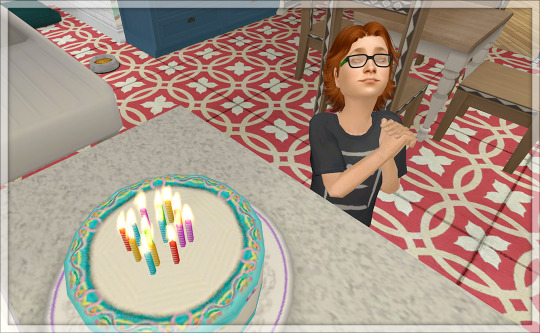
Anyway, it's time to put any sibling rivalry aside, as it's Brandon's 13th birthday! That looks like some wish he's making.

Time to blow out the candles!
"What, now?"
"Yes!"

"OK!"
~ Scorpio 7 / 10 / 10 / 7 / 9
~ Dog Person / Bookworm / Virtuoso / Social Butterfly
~ OTH: Music & Dance
~ Favourite Colour(s): Green
~ Aspiration: Popularity / Fortune
~ Turn-ons / -off: +Cultured / +Well-Liked / -Brown Hair
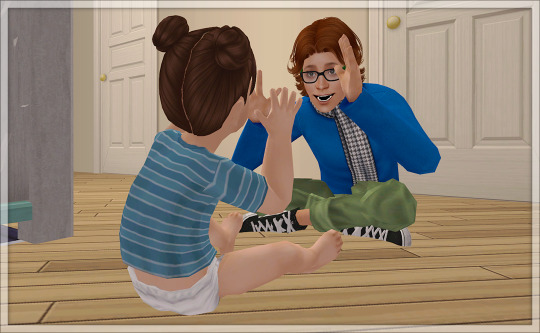
Although most of his extended family have gathered to celebrate his birthday with him, Brandon doesn't want little sister Elizabeth to feel left out, so he makes it a priority to give her some attention too. What a sweetie!




As soon as he gets a chance, he heads straight out to the garage to try out his birthday present. Maybe his brother Giles was right - perhaps piano isn't his instrument after all!

I hadn't realised what a high achiever he is all round - I think he has a bright future ahead of him!
(I also realised that he actually has Beth's eyes, not Bertram's, so he's 'grown out' of his glasses now - I have a rule that any child who shares the eye shape of a parent that wears glasses, will also wear glasses themselves.)

Elizabeth's birthday shortly after is a much quieter affair.
~ Cancer 10 / 9 / 9 / 10 / 7
~ Coward / Dog Person / Good Sense of Humour
~ OTH: Fitness
~ Favourite Colour(s): Orange

She celebrates her birthday by defrizzing her hair, getting a new pair of glasses, and making a start on exercising her Dog Person powers on Midge.
#sims 2#gameplay#merybury#bertram bennet#beth brandon#brandon bennet#giles bennet#elizabeth bennet#midge bennet#bennet family
11 notes
·
View notes
Note
Hello! I was thinking about pride and Prejudice and wondering if the Bennets' situation would have been so different with a son. I mean, ok, no Mr Collins inheriting Longbourn, a potential husband wouldn't have to look after Mrs Bennet and her unmarried daughters as there was a son to do so. But the girls still had no dowary and no real education so they still wouldn't be seen as good matches. And having a widow mother and several unmarried sisters wouldn't help Mr Bennet junior himself to afford to marry and start a family. What do you think? (English isn't my native language so I apologise if my question is difficult to understand 😅)
Your question is not difficult to understand, and it shows that Mr. Bennet has had a bad plan all along.
I doubt the overall parenting quality of the Bennets changes at all with a son. Hopefully Little Bennet Boy (LBB) is at least sent to school/university so he can have a decent education, but I am betting the same laissez-faire method is used for the girls. So now you have a family of four/five girls and one boy who is expected to be their sole provider... great.
When LBB comes of age (21), Mr. Bennet and his son could break the entail if they both agreed to do so. Now LBB might be opposed to such a plan, after all, if the entail isn't broken he gets the entire pie, but Mr. Bennet could threaten to cut off his allowance or something to persuade him. Selling some land could raise money for the girls' dowries, making them more able to marry. LBB is hopefully left with enough land to still be a distinguished landowner.
HOWEVER
If Mr. Bennet dies before LBB is 21, he inherits everything. And then we need to know if LBB is a John Dashwood or a Mr. Darcy, because I'm pretty sure once he reaches his majority he could kick everyone out. I think it would be normal to live with his mother and sisters until he got married, but then their position in the household would become precarious.
We know that the Lucases were worried about supporting Charlotte in her spinsterhood, so I doubt LBB would be thrilled to have five sisters to support. All of this said, the whole plan was always stupid and more importantly, selfish. Mr. Bennet would rather rob the future to support his own children than save money himself.
#question response#pride and prejudice#mr. bennet#what if#they had a son#If the son was anything like Lydia the girls would be screwed#or Tom Bertram for that matter#thanks for the question!
78 notes
·
View notes
Text
Revisiting my very old P&P fic!
So I didn't initially remember which fic had the Jane-Darcy scene, only that it was an early one, so I went to AO3 and looked at some of my very early fics to refresh my memory before realizing it was Season of Courtship all along.
I only mention this because it was a bit entertaining to re-visit my old P&P fic (despite the very uneven prose) because they were weird and often melodramatic but are still recognizably mine. Like:
Left to Follow: my first Austen fic ever and it's largely trolling. Darcy has apparently cheated on his wife, who has returned home to her father and family with her sickly baby. It's from the perspective of her father. The twist, revealed at the end, is that Darcy is actually the sickly baby and the POV character is his grandfather the earl. (This originally grew into a much longer and more meandering fic than the AO3 version but it kind of sucked, so I only cross-posted the first part.)
Sword and Sorcery: a vaguely tongue-in-cheek series of vignettes in a fantasy AU. Wickham is a vampire, Elizabeth has plant powers of some kind, Georgiana is unexpectedly a necromancer, and Darcy is an empath and has become so overconfident about his (genuinely very strong) abilities that he doesn't seriously think about why he's not picking up much from Jane (it's because she is also an empath and naturally resistant to his powers) or even bother trying to read Elizabeth properly until she rejects him.
Catalyst: a twist on the then-popular fanon of Darcy only really seeing the truth of Elizabeth's criticisms by talking about the Hunsford fight with a cousin like Colonel Fitzwilliam who advocates for Elizabeth's righteousness. In the fic, Darcy does end up talking about it with a cousin (Fitzwilliam's sister) who takes his side in such a forceful classist way that he realizes he sounded like that to Elizabeth.
Such Terms of Cordiality: a chaotic cluster of AU premises. Lady Anne and Mr Bennet used to be in love but she was persuaded away Anne Elliot-style and married Darcy's father instead (their respective children know nothing about this). Darcy and Elizabeth meet at Ramsgate the summer before the novel begins and fall in love with little complication. Jane is not in love with Bingley and struggling with the pressure to be. Lady Anne is still alive. Mr Bennet is opposed to Darcy/Elizabeth and she ends up confronting him about it. I had planned for it to be a reverse-forced marriage scenario, where Darcy and Elizabeth end up married without their canonical character growth and have to grow within marriage, but it's entirely voluntary (I never got that far).
Season of Courtship: my most popular fic even now and easily the most normal thing from that time (it does have some of the melodrama, but it's just about the canon engagement period).
The Widow: Tom Bertram falls in love with a widowed Elizabeth Darcy.
Incumbrance of Mystery: a cracky murder mystery in which Georgiana gets murdered.
Claims to Reputation: probably my personal favorite of these, but it's not quite a fair comparison because I revised it pretty comprehensively later on. It's an unfinished epistolary fic in which Lydia and Wickham's two eldest children, Bess and George, attempt to scheme and maneuver their way into fortune by exploiting their Bennet connections, confiding their true feelings and motives only in their letters to each other. Bess (the more calculating and amoral of the two) is largely successful with Collins's and Charlotte's mediocre son, while George falls genuinely in love with Elizabeth and Darcy's beautiful but extremely withdrawn and wary daughter. He, however, is hampered by the suspicion of pretty much everyone.
It's basically just this flurry of letters around the whole (double) business from everyone connected with it except Miss Darcy; you have to extrapolate what she really feels about it from the (deeply biased) perspectives we get from everyone else. There are also some references to Bess and George's younger sister, Bella, being a sort of inverted Fanny Price—she's the poor relation/niece raised at Mansfield Pemberley, but has been treated much more gently than Fanny ever was and is integrated into the family.
It was odd and challenging and fun!
#the most out there premise is undoubtedly subsequent connections (which i would never have thought of on my own)#(the idea came from a different fic and i was like 'hmm interesting concept! it might be fun to do it like this...')#but that one does seem to be a bit later than these#probably because i drastically overhauled it later though#anghraine babbles#fic talk#austen blogging#austen fanwank#fic talk: left to follow#fic talk: sword and sorcery#fic talk: catalyst#fic talk: such terms of cordiality#fic talk: season of courtship#fic talk: comforts and consequences#courtship#comforts and consequences#long post
23 notes
·
View notes
Text
Austen brOTPs
I did polls for best and worst Austen sibling duos, so how about the non-sibling and non-romantic duos?
Again, please vote by book depiction, not movies.
In alphabetical order by last name for fairness, so read the whole list first before you vote!
I have a silly version of this poll with inanimate objects and concepts that you should vote in too!
#i think i'll do a run-off poll after this to find the ultimate austen duo out of all my duo polls#jane austen characters#jane austen#polls
75 notes
·
View notes
Text
#polls#jane austen#pride and prejudice#emma#persuasion#mansfield park#northanger abbey#sense and sensibility
164 notes
·
View notes
Text
So, there's this famous quote (and source of many memes) from Northanger Abbey, where Henry Tilney says:
“and this is a very nice day, and we are taking a very nice walk, and you are two very nice young ladies. Oh! It is a very nice word indeed! It does for everything. Originally perhaps it was applied only to express neatness, propriety, delicacy, or refinement—people were nice in their dress, in their sentiments, or their choice. But now every commendation on every subject is comprised in that one word.” (chapter 14)
Indeed, Jane doesn't seem to like the word that much, at least in this novel: of the 14 times it is used, 3 happen before this exchange, 10 during it, and then one last time in chapter 29.
It appears
7 times in Pride and Prejudice (used mainly by Lydia, but also by Mrs Bennet, Mrs Gardiner and Lady Catherine);
12 in Sense and Sensibility (by sir John, Marianne, Edward, Mrs Palmer, and Mrs Jennings most of all);
17 in Emma (by Harriet, Mr Woodhouse, Emma, Miss Bates, Mrs Elton, and Mr Weston);
15 in Mansfield Park (by Mrs Grant, Mrs Norris, Mary, Tom, Mr Crawford, Maria, and Edmund);
12 in Persuasion (by Elizabeth, Wentworth, Admiral Croft, Mr Elliot, Mary
But of those, none are used by the narrator in NA; 2 in P&P; 3 in S&S; 5 in Emma; 4 in MP; and 6 in Persuasion (and I'm including all indirect speech). Very nice.
But you know what generic, vague descriptor our beloved Jane loved? fine.
NA: 33 times (18 from dialogue: used my Mrs Thorpe, Mr Allen, Mrs Allen, John Thorpe, Catherine, a miss Thorpe, Isabella, Tilney, and Mrs Morland.)
P&P: 40 times (21 in dialogue: used by Mrs Bennet, Charlotte, Lizzy, Darcy, Caroline, Mrs Gardiner, Mrs Reynolds, and Mr Bennet)
S&S: 29 times (17 in dialogue: used by Willoughby, Marianne, Edward most of all, Mrs Palmer, Anne Steele, and Mrs Jennings)
Emma: 48 times (33 in dialogue: used by Harriet, Mr Woodhouse, Mr Knightley, Emma, Miss Bates, Jane Fairfax, Mr Weston, Frank, Mrs Cole, Mrs Elton)
MP: 67 times (38 in dialogue: used by Mr Rushworth, Lady Bertram, Edmund, Mrs Norris, Fanny, Mrs Grant, Dr Grant, Mr Crawford, William, Mrs Price, Mr Price, and Mary)
Persuasion: 35 times (17 in dialogue: by Mrs Musgrove, Mrs Croft, Charles Musgrove, Sir Walter, Admiral Croft, Captain Wentworth, lady Dalrymple, Harriet Smith).
Not only is fine used much, much more than nice, but nice is most often used by silly or unrefined characters, whereas fine sees more representation of all sorts of characters, and it is used by the narrator specifically, much, much more, not only to describe weather, but to describe people, places, clothes, and so on and so forth.
So, dear Jane, I think we need to talk...
94 notes
·
View notes